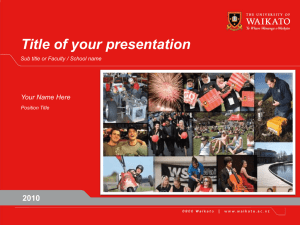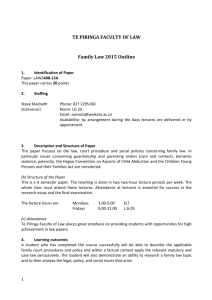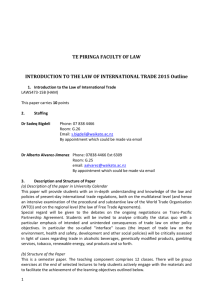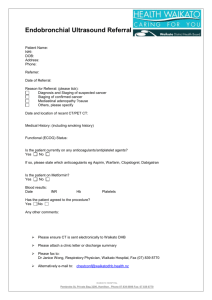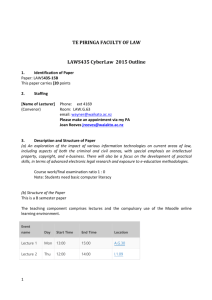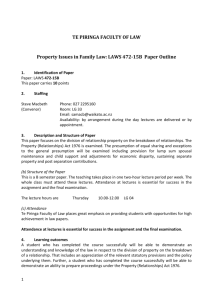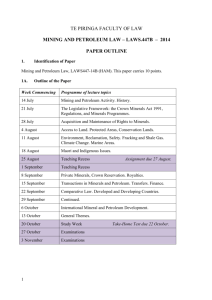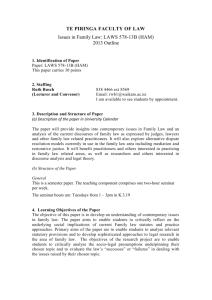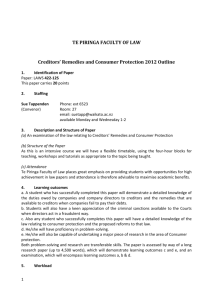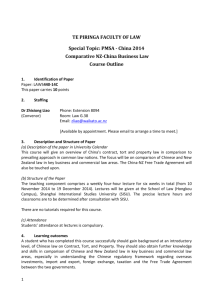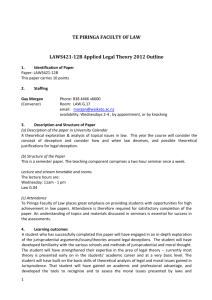1. International Trade - The University of Waikato
advertisement
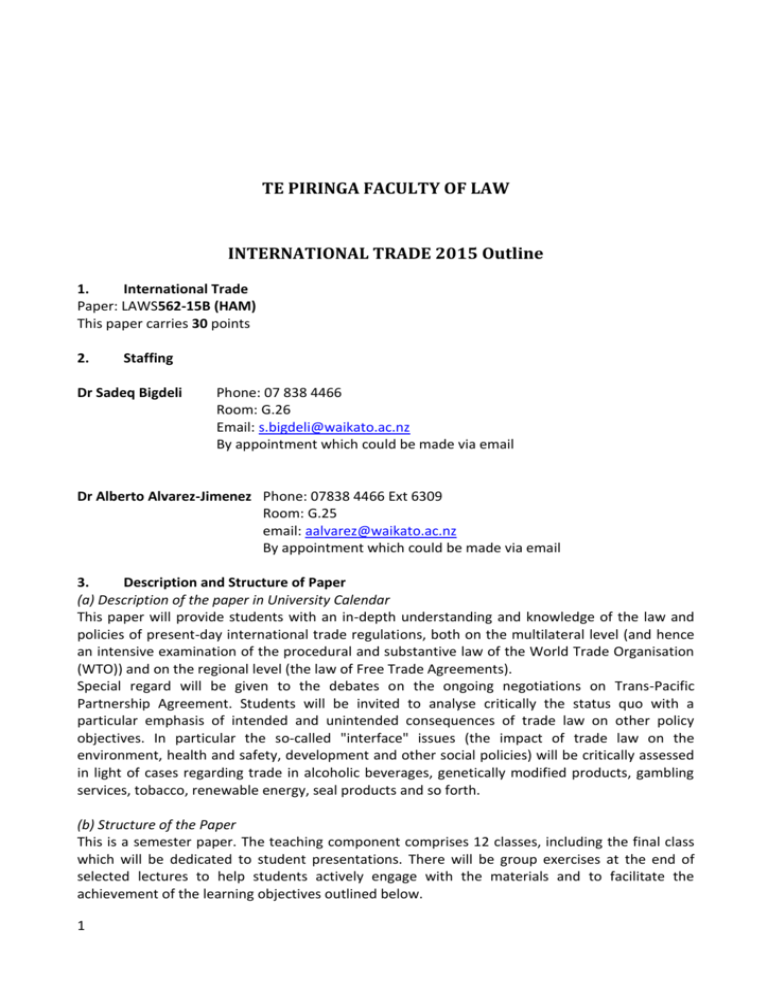
TE PIRINGA FACULTY OF LAW INTERNATIONAL TRADE 2015 Outline 1. International Trade Paper: LAWS562-15B (HAM) This paper carries 30 points 2. Staffing Dr Sadeq Bigdeli Phone: 07 838 4466 Room: G.26 Email: s.bigdeli@waikato.ac.nz By appointment which could be made via email Dr Alberto Alvarez-Jimenez Phone: 07838 4466 Ext 6309 Room: G.25 email: aalvarez@waikato.ac.nz By appointment which could be made via email 3. Description and Structure of Paper (a) Description of the paper in University Calendar This paper will provide students with an in-depth understanding and knowledge of the law and policies of present-day international trade regulations, both on the multilateral level (and hence an intensive examination of the procedural and substantive law of the World Trade Organisation (WTO)) and on the regional level (the law of Free Trade Agreements). Special regard will be given to the debates on the ongoing negotiations on Trans-Pacific Partnership Agreement. Students will be invited to analyse critically the status quo with a particular emphasis of intended and unintended consequences of trade law on other policy objectives. In particular the so-called "interface" issues (the impact of trade law on the environment, health and safety, development and other social policies) will be critically assessed in light of cases regarding trade in alcoholic beverages, genetically modified products, gambling services, tobacco, renewable energy, seal products and so forth. (b) Structure of the Paper This is a semester paper. The teaching component comprises 12 classes, including the final class which will be dedicated to student presentations. There will be group exercises at the end of selected lectures to help students actively engage with the materials and to facilitate the achievement of the learning objectives outlined below. 1 - Time: Thu 15:00 - 17:00 Location: S.B.03 4. Learning outcomes A student who has successfully completed this paper will be able to 1. Acquire knowledge of the applicable rules and doctrines governing international trade relations; a. In-class group exercizes at the end of selected lectures will help achieve this goal. 2. Critically examine the political economy and ideological roots of international trade law and economic theories; a. Active participation in class debates, based on readings before class, (which will be marked as a portion of the final grade) will help students achieve this goal. 3. Critically analize the current status of and constraints associated with international trade law in light of the recent decline of multilateralism (WTO) and the rise of regional integration (Free Trade Areas such as the ongoing talks on Trans-Pacific and Trans-Atlantic Free Trade Areas) a. Class presentations and research essays are aimed to achieve this goal. 5. Workload Students should expect to spend 300 hours in total on this paper. In addition to lecture attendance, significant time will need to be spent on background and complementary reading. Students should allow for periods of more-focused research time in the preparation of assignments. A NOTE TO STUDENTS: IF YOU COME TO CLASS UNPREPARED, YOU MIGHT FEEL LIKE YOU ARE EXPOSED TO A COMPLETELY FOREIGN LANGUAGE! You should really think of this as an opportunity rather than threat, since “class participation” is not about giving “right answers”. It would be sufficient for you to show enthusiasm and seriousness to obtain a full grade regarding this component of your final exam (5% of the final mark). You will see it will be fun! 6. Required and Recommended Reading All law students are required to purchase, for use in all law papers, a copy of McLay, Murray & Orpin, New Zealand Law Style Guide, 2nd edition, Thomson Reuters (2011). This is available from Bennetts. In addition to the texts identified below, the Faculty of Law requires that students purchase the course materials book(s) for this paper. These are available from Waikato Print. 2 Compulsory materials will be posted on Moodle (http://elearn.waikato.ac.nz), the University of Waikato’s online learning system. In addition, the following textbook is required: Peter Van den Bossche, The Law and Policy of the World Trade Organization, Text, Cases and Materials, 2nd Edition, Cambridge University Press, 2008, Paperback ISBN: 9780521727594 Alternatively, students might use other known trade law textbooks such as: - Trebilcock and Howse, Regulation of International Trade, (3rd ed., Routledge, 2005) [There is an updated version published in 2012 by Trebilcock, Howse & Eliason] - Jackson, The World Trading System, Law and Policy of International Economic Relations (2nd ed, MIT Press, 1997) - Matsushita, Schoenbaum and Mavroidis, The world trade organization : law, practice, and policy (Oxford University Press, 2006) - Cottier and Oesch, International trade regulation : law and policy in the WTO, the European Union, and Switzerland : cases, materials, and comments (Cameron May, 2005) - Palmeter and Mavroidis, Dispute settlement in the World Trade Organization: Practice and procedure, (Cambridge University Press, 2004) - Jackson, Davey and Sykes, Legal problems of international economic relations : cases, materials, and text on the national and international regulation of transnational economic relations (St. Paul, Minn. : West Group, 2002) - Lester, Mercurio, Davies, World Trade Law: Text, Materials and Commentary (Second Edition), Hart Publishing 2012. - Trebilcock, Understanding Trade Law, Edward Elgar 2012 Additionally, the following sources will be essential for your research: Journals: - Journal of International Economic Law - Oxford Journals - World Trade Review – Cambridge Journals - Journal of World Trade – Kluwer International Websites or data bases (available on Waikato Library Databases): 3 - wto.org - Tradelawguide.com - Worldtradelaw.net Further material may be provided on the paper site on Moodle (http://elearn.waikato.ac.nz), the University of Waikato’s online learning system. Any such material is provided on the following terms: 7. Online support Online support for this paper is provided via Moodle. 8. Assessment a) Requirements for assessed work Te Piringa Faculty of Law procedures for the presentation, submission and referencing of course work are set out in the Te Piringa Faculty of Law Undergraduate Handbook @ p.33 which is available from http://www.waikato.ac.nz/law/undergraduate. Assignment resources are available online at http://www.waikato.ac.nz/law/student/ The length of the final written research paper is to be no more than 10,000 words inclusive of footnotes and bibliography. Word limit should be observed strictly. b) Coursework: Final Examination Ratio: 100/0 c) Assessment Components Component Percentage of overall mark Due date I. Active class participation (debates, class exercises) 5 n.a. II. In-class presentations 10 final class III. Research proposal 10 10 Sept. IV. Research paper (10k words) 75 2 Nov. I. 4 Active participation consists of engagement in debates and Q&As when students are called on and end-of-class exercises collectively carrying 5% of the final mark. This component will be fundamental in order to achieve all the learning objectives indicated in section 4. II. In-class presentations carries another 10% of the final mark and will help students specifically achieve Goal Three of the learning objectives. The topics of presentations will be the same as your research topic (see below) and will help you develop and more deeply engage with your research question. Presentations will take place in the final class. The timing of presentations will approximatley be five minutes but will be adjysted based on the number of students enrolled. You can use powerpoint (one slide max) or Prezi or no technology at all. Timing however will be strictly enforced. III. Research Proposal carries 10% and includes the topic (see the next paragraph), research problem, an abstract, an outline and an annotated bibliography. Proposals are due on September 10. IV. Research papers (due Nov 2) carry 75%. Here you get a chance to develop your research question (as presented in class) into a full essay [10k words inclusive of footnotes and bibliography]. Topics will be particularly focused on regionalism: the relationship between multilateral trading system (the World Trade Organization) and regional trade agreements. Some time in the first half of the semester (tba), each of you will be assigned a regional trade agreement, which would be relevant to your own background and interests (e.g. Trans-Pacific Partnership Agreement which is under negotiation; China-NZ Free Trade Agreement; ASEAN – Australia – NZ Free Trade Agreement, etc.). d) Handing in, marking time and collection All assignments must be submitted electronically through Moodle (http://elearn.waikato.ac.nz). See Te Piringa Faculty of Law Undergraduate Handbook, available at http://www.waikato.ac.nz/law/undergraduate. It is the policy of Te Piringa Faculty of Law to return marked work to students within five weeks of submission. If you require assistance with Moodle, or encounter any problems, please contact the Help Desk. You can send a message to Help Desk by using the instant message service in your paper (from the participants list within the People block). Alternatively, you can email them directly at help@waikato.ac.nz or call 838 4008. e) Measurement of Achievement Achievement in examinations and tests will be measured primarily in terms of levels of understanding and knowledge gained. Achievement in assignments will be measured also in terms of fluency and accuracy of expression and referencing. Major deficiencies in structure, style, grammar and spelling will result in lower marks. f) Management of assessment deadlines, process for requesting extensions and special consideration, and for appeals (i) Extensions Students are required to complete and submit all internal assessments by specified dates. The meeting of deadlines is a mark of professionalism and its enforcement is essential for fairness to all students taking the paper. Handing in course work on or before the due date also facilitates the timely return of marked work by academic staff. Students should meet requirements as to 5 time deadlines for course work, or make a request for an extension or special consideration in appropriate circumstances (see Undergraduate Programmes Manual available from the School of Law Undergraduate website http://www.waikato.ac.nz/law/undergraduate/). Failure to comply with requirements as to the time deadlines for internal assessment without having successfully applied either for an extension or special consideration with supporting evidence before the due date will result in deduction of 2.5 marks for each day the work is late. Lateness of more than a week may result in the work not being marked. No deadlines may be extended beyond two weeks after the last teaching day of the semester(s) in which the paper is taught as final grades must go to the Board of Examiners at this time. Unless an extension in writing has been granted, a lecturer may refuse to accept a piece of work which is submitted after the specified date, and automatically award it no mark, or may lower the mark as a penalty for lateness. Applications for extension, on the form obtainable from the Law Reception, must be submitted to the Chief Examiner or nominee. Students should not submit the extension form to the lecturer, nor should students seek extensions from the lecturer via other forms of communication. Extensions will be granted only on evidence of illness, family bereavement, or serious personal accidents or circumstances. Please note that too many assignments due at the same time is NOT an acceptable reason, neither are claims that computers and/or printers have crashed. Account will be taken of the time in which the student has had to complete the internal assessment before the intervening event occurred. It will be important to consider if the grant of the extension will give the student in question an unfair advantage over other students. A maximum period of 14 days will be given as an extension unless there are exceptional circumstances. In determining applications the Chief Examiner or nominee may consult with the Convenor or lecturer of the relevant paper. When the Chief Examiner or nominee has made a decision on the application for extension, the nominated Administrative Assistant will advise the student of the decision by email. Following this, the extension form will be given to the relevant lecturer who will retain it until after the assignment is marked and returned to students. The form will then be placed on the student’s file. It should be noted that if an extension of longer than 14 days is granted, the assignment will not be automatically printed out and delivered to the lecturer, therefore the lecturer is responsible for ensuring the assignment is printed. In appropriate cases, when a student’s application for extension is declined the Chief Examiner or nominee will inform the student of the process for applying for special consideration. ii) Special Consideration The Assessment Regulations 2005 as set out in the University Calendar 2015 list in detail the university-wide policies and procedures, which apply concerning missed examinations, impaired performance or impaired preparation time for an examination, and missed or impaired course work. Students are responsible for ensuring that they comply with these regulations. Application forms for special consideration for internal assessment are available from law reception. iii) Appeals (University Calendar 2015, Assessment Regulations 2005, Reg. 24) A student may appeal against any decision taken under these regulations. An appeal, comprising a written statement of the circumstances of the appeal, together with supporting evidence if available, must be submitted by the student in writing to the Head of 6 Student & Academic Services not more than seven days after the date on which notification of the relevant decision is received. Appeals under this section are considered and decided by the Deputy Vice-Chancellor by delegated authority of the Education Committee. A decision by the Deputy Vice-Chancellor is notified in writing, and is final. iv) No electronic devices are allowed in any internal tests or exams. v) If you wish to submit your Internal Assessment in Mãori, you need to obtain an application form from the Law Reception at least 14 days before the assessment is due. vi) If you wish to apply to write your official exams in Mãori, you need to complete the official application form from the University’s Assessment Office. (refer to the Policy on the Use of Mãori for Assessment in the University Calendar) 9. University Calendar Regulations and Policies Your attention is drawn to the following regulations and policies, which are published in the University Calendar 2015: Assessment Regulations 2014 Change of Enrolment Regulations 2012 Student Discipline Regulations 2014 Computer Systems Regulations 2005 Policy on the Use of Māori for Assessment Student Research Regulations 2008 Ethical Conduct in Human Research and Related Activities Regulations 2008. 10. Links to other papers There is no prerequisite set for this paper. Other papers that are closely linked to this paper include the Introduction to the Law of International Trade, Public International Law and International Environmental Law. 11. Fees Refer to http://calendar.waikato.ac.nz/admission/tableoffeesandcharges.html. 12. (a) (b) 7 Referencing guidelines and caution against plagiarism Referencing must be in accordance with the New Zealand Law Style Guide (2nd Ed) Thomson Reuters 2013. All written work submitted for the purposes of assessment must be your own work. Copying or paraphrasing all or part of another person’s work, be it published or unpublished, without clear attribution, is plagiarism. Plagiarism is misconduct and is dealt with under the disciplinary procedures of the University as outlined in the Student Discipline Regulations 2014 in the University Calendar. “Plagiarism means presenting as one’s own work the work of another, and includes the copying or paraphrasing of another person’s work in an assessment item without acknowledging it as the other person’s work through full and accurate referencing; it applies to assessment presented through a written, spoken, electronic, broadcasting, visual, performance or other medium.” See section 3, Assessment Regulations (2015 Calendar) (c) The Te Piringa - Faculty of Law’s policy regarding plagiarism is in the Te Piringa - Faculty of Law Undergraduate Handbook, available from: http://www.waikato.ac.nz/law/undergraduate/. 13. Health and safety The Faculty of Law’s Health and Safety representative is TBA. Please report the incident to the Law Reception - Room Law G.44 or call ext 4167. 14. Class representation Contact details for the Student Representation Coordinator, Academic Services Division, are as follows: Jeanie Richards, Student Services, ext. 8221, email: student.reps@waikato.ac.nz. Further information can be found at the Class Rep google site. 15. Complaints procedures The Student Complaints Procedures provides details of the University’s process for handling concerns and complaints and is published in the University Calendar. 8 Lecture Schedule B semester Week Commencing Programme of lecture topics 13 July 1. Theoretical foundations of international trade law and governance 20 July 2. Introduction to the history of World Trade law 27 July 3. An institutional analysis of the WTO including its dispute settlement system 3 August 4. GATT Rules on Market Access and MostFavoured Nations (MFN) Principle 10 August [Assigning specific RTAs to students for 5. MFN exceptions including Regionalism presentations and research papers] 17 August 6. National Treatment (GATT) 24 August Teaching Recess 31 August Teaching Recess 7 September Trade in Services (GATS) 14 September (17 September Kingitanga Day) 8. No Class. 21 September 9. Rules on “Unfair Trade” 28 September 10. Trade and Societal Values 5 October 11. Trade and Regulatory Harmonization. Competing Discourses of Trade and Sustainable Development 12 October 12. In-class presentations 19 October Study Week 26 October (26 October Labour Day) Examinations 9 2 November 10 Examinations 11
